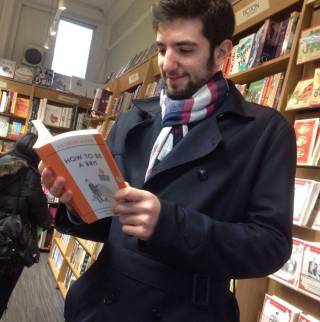Ask our STEM Ambassadors: Focus on Maximlien Rothier Bautzer
16 February 2017

Maximlien Rothier Bautzer is an MRes candidate at the department of biochemical engineering at UCL. He is working with a startup called Synthace, which is a using a programming language for biological experiments called Antha in order to dramatically speed up research. Originally from France, Maxenjoys sharing his passion through his involvement in the STEM ambassador program.
How would you describe your area of study or work?
I work in synthetic biology, one of the newest and most exiting field in biology. As the cost of synthesizing and sequencing DNA fell rapidly, the idea that we could start to apply engineering principles to biology in order to modify and control cells started to take hold of many biologists. It is hard to overstate the implications of this idea. Some of the crazier (and popular) researchers are talking about bringing back mammoths, or curing people of their genetic diseases before they are even born. If you want to think more about it I recommend the book “Regenesis” by George Church. You might be surprised to learn that most of the far-fetched ideas in synthetic biology are not science fiction. Despite ethical concerns, Chinese researchers have already done a proof of concept experiment on (unviable) human embryos where they fixed a malfunctioning gene. Genetically engineering rats, bacteria, or other model organisms is a routine job in all biological laboratories. Synthetic biology (or biochemical engineering as it is sometimes called) is therefore simply the process of applying engineering principles to manipulate biological systems.
How did you decide to study in your chosen field?
I’ve been drawn toward the ideas of synthetic biology very early. I could not get enough books on the subject, I even wrote articles about it in my high school newspaper. I think the real turning point was when I read about a much-publicized breakthrough made by Craig Venter: the first computer designed cell had been created. This made me realize that genetic engineering would probably lead to a technology with as much impact as the internet. A few years ago, nobody could have imagined that you could have instant access to all the world’s information, but now it is an integral part of our lives. I became convinced that genetic engineering will have a similar impact on our lives, and radically change the way we think about ourselves. I wanted to contribute to the emergence of this technology, so I pursued this field.
What attracted you to participate in outreach and engagement activities?
I’ve always loved to communicate my passion about the field to other people. I gave talks and wrote articles about it throughout my whole life. I think that a lot of the fear around the implication of genetic engineering stem from a lack of understanding of basic biology, so I want to teach people about it.
What are the best things about being a STEM Ambassador?
I think the most enjoyable thing about this experience has been the enthusiasm shown by the kids. I think that once they learn about it, they immediately start to realize the incredible potential of biochemical engineering. It’s easy to forget how interesting some of what you are doing is when you do it every day, and seeing how keen people are to learn about it really helped renew my own enthusiasm.
What type of activities or programmes have you led / run as a STEM Ambassador?
I visit a primary school regularly to animate some activities, and I participate in occasional visits to UCL by other schools.
What are the benefits of volunteering as a STEM Ambassador?
I think it will depend on what you are looking for, in my case I just enjoy the experience of teaching. It helps me gain a clearer grasp of my own ideas, and I like to share what I know.
What was the reaction of the young people you worked with?
I can say it has been positive in all cases. It has been harder to get enthusiastic reactions from older kids, but they all seemed genuinely interested.
What advice would you give young people wanting to study or work in STEM-related fields?
It can sometimes seem like science is a dry subject in which you just must learn facts by heart, but this could not be further from the realities of working in a lab. Do not rely on textbooks to learn about your subjects, try to formulate your own projects or do your own experiments as much as possible. It might be because of who I am, but I find that I learn a lot more (and remember it longer) by trying to solve problems than by going through exercises or case studies.
 Close
Close

